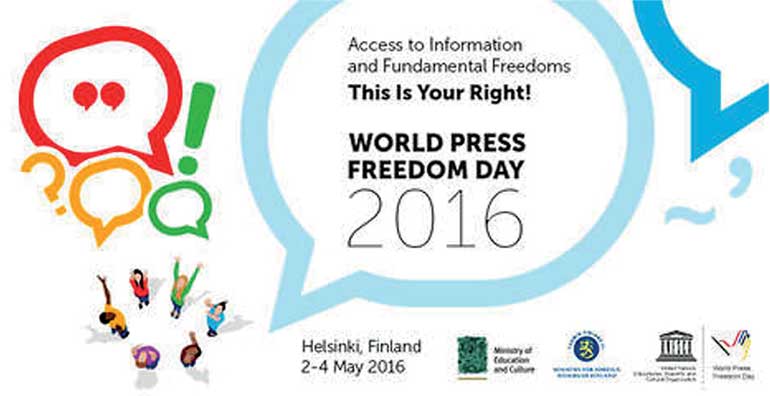Tuesday Feb 24, 2026
Tuesday Feb 24, 2026
Tuesday, 3 May 2016 00:02 - - {{hitsCtrl.values.hits}}
UNESCO’s flagship celebration of World Press Freedom Day (3 May) will take place in Helsinki, Finland, this year from 2 to 4 May.
The overarching theme of the forthcoming celebration is Access to Information and Fundamental Freedoms with a focus on: Freedom of Information and Sustainable Development, Protecting press freedom from censorship and surveillance overreach and Ensuring safety of journalists online and offline.
The link between press freedom and sustainable development is made for the first time this year, following the adoption in late 2015 of the United Nation’s Sustainable Development Goals (SDGs) for 2030, which recognise the need to “ensure public access to information and protect fundamental freedoms, in accordance with national legislation and international agreements,” (SDG 16 point 10).

The importance of free and independent media to inform the citizens of the world is crucial to the achievement of the SDGs, argues the Director-General of UNESCO, Irina Bokova, in her message for the Day: “At this time of turbulence and change across the world, including new challenges that require global cooperation and action, the need for quality information has never been so important—this requires a strong environment of press freedom and well-functioning systems to ensure the people’s right to know.”
The Director-General will speak about UNESCO’s promotion of press freedom and freedom of information, and action to enhance the safety of journalists and to end impunity, during the opening of the two-day conference and celebration on the morning of 3 May, when she will take the floor alongside Juha Sipilä, the Prime Minister of Finland, and Jussi Pajunen, the Mayor of Helsinki.
Plenary sessions will tackle the following subjects: Press freedom, right to information and transparency over the past quarter century, Surveillance overreach, Data protection and online censorship, Freedom of information as a fundamental freedom and human right, and, finally the adoption of a Declaration, to be known as the Finlandia Declaration, by the events’ 1,000 plus participants (media professionals, government representatives and those of intergovernmental and nongovernmental organizations as well as civil society).
In nine parallel sessions, the participants will take stock of a wide range of political, societal and technical issues relating to freedom of expression: The impact of the current refugee crisis on public service media values, Artistic freedom and development, Whistleblowers and journalists’ source protection, Countering hate speech in the media, Gender, Radicalisation in the social media, and Disinformation.
Also on the agenda are discussions about access to information and sustainable development goal indicators and safety of journalists, a subject of particular concern to UNESCO which denounces every fatal attack targeting media workers and advocates an end to the impunity enjoyed by the vast majority of the perpetrators.
This year’s conference breaks new ground in establishing the link between artistic freedom, media diversity and press freedom as promoted by UNESCO’s Convention on the Protection and Promotion of the Diversity of Cultural Expression.
These issues will be examined in Parallel Session II with the participation of Finland’s Minister of Education and Culture, Sanni Grahn-Laasonen and also in one of the conference’s 30 side events ‘Re-shaping Cultural Policies for development, Promoting Diversity of Cultural Expressions and Artistic Freedom in a Digital Age’ with, among others, the participation of government ministers from all the Nordic countries the Director-General of UNESCO and a panel of artists from Africa, Asia Europe, and the Middle East.
On the evening of 3 May, Sauli Niinistö, President of Finland, and Irina Bokova, Director-General of UNESCO, will lead the UNESCO/Guillermo Cano World Press Freedom Prize-giving ceremony, whose winner this year is Khadija Ismayilova, an investigative journalist from Azerbaijan. The $25,000 Prize is named in honour of Guillermo Cano Isaza, a Colombian journalist who was assassinated in front of the offices of his newspaper, El Espectador, in Bogotá, on 17 December 1986. It is funded by the Cano Foundation (Colombia) and the Helsingin Sanomat Foundation (Finland).
This year’s celebration will end with a seminar on 4 May assessing the impact of development projects promoting freedom of expression in the Arab Region funded by the governments of Finland and Sweden. An exhibition of works by nine young photojournalists trained by the regional project UNESCO organized with funding from Finland and Sweden will be on display during the World Press Freedom Day event.
The celebration of World Press Freedom Day 2016 is organised in partnership with the Finnish Ministry of Education and Culture and the Ministry of Foreign Affairs, with the support of some 50 civil society and media organisations.
Some 100 World Press Freedom Day events are organised around the world this year.